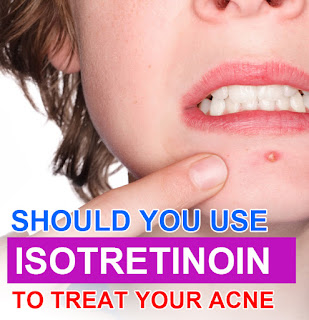Isotretinoin is a retinoid that is derived from Vitamin A. It has a chemical name that is just as mind boggling, 13-cis retinoic acid. While it is not necessary to know how it is produced or take a degree in chemistry to understand it, you do need to know how it is used to treat acne and if there are any adverse side effects.
Isotretinoin is extremely effective for dealing with severe acne and in most cases, doctors only prescribe it as a last resort when conventional cleansing methods and acne creams fail. This drug is highly potent and should be consumed very carefully.
It is so powerful that pregnant women who consume it will cause their unborn child to have birth defects in future. This drug must always be prescribed by a doctor and you will need to follow your doctor’s instructions to the letter.
If you’re sexually active while on Isotretinoin, it will affect you should you get pregnant. The best person to talk to in this case, will be your doctor. While Isotretinoin is very strong and does have a few undesirable side effects, it is the last bastion of hope for acnes sufferers who have tried everything else to no avail.
So, how does Isotretinoin work?
Basically, it treats the acne by shrinking the sebaceous glands and reducing sebum production. Since the over-production of sebum leads to clogged pores and infected glands, this is a very efficient way of halting the acne problem from worsening.The drug is anti-inflammatory and removes comedones which leave the treated skin dry. This will inhibit the growth of the bacteria that causes acne since conditions on the skin are unsuitable for it to thrive.
The doctor usually prescribes Isotretinoin when the acne is severe, may cause scarring or when moderate acne medication seems to have no effect on the patient’s acne condition. Isotretinoin is also prescribed for other skin conditions such as folliculitis, seborrhoea, chloracne and other diseases that have symptoms that resemble acne.
Your doctor will decide on your dosage. This is where things get tricky. Many people think that they can get rid of their acne faster by upping the dosage on their own in the privacy of their home. Do not do this. Let the body convalesce on its own time. You cannot rush the healing process and may do more damage than good. There is no rush.
Since this is a strong drug, your doctor will monitor your progress and schedule future appointments so that they can check if the drug is working and see if there are any adverse side effects.
In most cases, you will start with a small dosage to see if the body is responsive. If the acne shows signs of diminishing, the dosage will be increased. You will need to consume it after eating because the drug needs fat to assist with its absorption into the body. Once again, your doctor will tell you exactly what to do.
There are some side effects that come with Isotretinoin. You may experience dry mouth, dry nose, thinning of hair, fatigue, dry skin, red itchy eyes, sore lips etc. If you experience any other side effects such as muscle aches, difficulty walking, depression, vomiting etc. seek medical help immediately. Do not just bury your head in the sand and expect the side effects to go away on their own.
In conclusion, you should only use Isotretinoin to treat acne if it is very serious. Most people do not have such serious acne. If you have mild or moderate acne, you can definitely make some changes to your lifestyle to prevent breakouts and use normal acne medication to alleviate your problem.



0 comments: